| Famous
People from Azerbaijan |
Azerb.com
|
| |
|
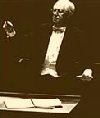 Mstislav
Rostropovich: (1927- ), The most esteemed cellist of his generation.
Born in Baku as the Soviet Union was becoming consolidated. At a tender
age he learned cello and piano from his parents. He studied (and later
taught) at the Moscow Conservatory. In 1950 he wins the International Cello
Competition in Prague, starting a career as a professional cellist, that
after 1961 develops into a double career as a cellist and conductor. He
also performs as pianist in recitals by his wife, the Soviet-born soprano
Galina Vishnevskaya. Despite winning the Lenin Prize, a Soviet state award,
in 1963, he sheltered the Soviet dissident Aleksandr Solzhenitsyn; in 1974
Rostropovich and his wife left the USSR, and in 1978 their citizenship
was revoked. Having emigrated to the United States, he became conductor
of the National Symphony Orchestra in Washington, D.C., in 1977. He was
invited to perform with his orchestra in the USSR in 1990, and his and
his wife's Soviet citizenship were restored.
Mstislav
Rostropovich: (1927- ), The most esteemed cellist of his generation.
Born in Baku as the Soviet Union was becoming consolidated. At a tender
age he learned cello and piano from his parents. He studied (and later
taught) at the Moscow Conservatory. In 1950 he wins the International Cello
Competition in Prague, starting a career as a professional cellist, that
after 1961 develops into a double career as a cellist and conductor. He
also performs as pianist in recitals by his wife, the Soviet-born soprano
Galina Vishnevskaya. Despite winning the Lenin Prize, a Soviet state award,
in 1963, he sheltered the Soviet dissident Aleksandr Solzhenitsyn; in 1974
Rostropovich and his wife left the USSR, and in 1978 their citizenship
was revoked. Having emigrated to the United States, he became conductor
of the National Symphony Orchestra in Washington, D.C., in 1977. He was
invited to perform with his orchestra in the USSR in 1990, and his and
his wife's Soviet citizenship were restored.
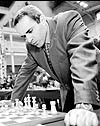 Garry
Kimovich Kasparov: (1963- ), chess player and world chess champion
of Jewish-Armenian descent, who competes for Russia. At the age of 22 he
became the youngest world chess champion in history. Born Garri Weinstein
in Baku, Azerbaijan, he learned chess from his father, who died when Garri
was seven years old. He subsequently adopted his mother's maiden name (Russian
adaptation of the Armenian "Kasparian"). At the age of 12 Kasparov won
the Azerbaijan championship and the USSR junior championship, and at the
age of 16 he won the world junior championship. In 1980, at the age of
17, "Garik," as he was known in the USSR earned the International Grandmaster
title. Two years later Kasparov became a candidate for the world championship,
and in 1984 he earned the right to challenge the world champion, Russian
Anatoly Karpov. Their first match was stopped, after it had lasted six
months without a deciding result. In 1985 Kasparov won a match against
Karpov and became the world champion. He defended his title by beating
Karpov in 1986, then tied a match with him in 1987 (a champion keeps the
title if the match ends in a tie). Kasparov beat Karpov again in 1990 and
retained his championship.
Garry
Kimovich Kasparov: (1963- ), chess player and world chess champion
of Jewish-Armenian descent, who competes for Russia. At the age of 22 he
became the youngest world chess champion in history. Born Garri Weinstein
in Baku, Azerbaijan, he learned chess from his father, who died when Garri
was seven years old. He subsequently adopted his mother's maiden name (Russian
adaptation of the Armenian "Kasparian"). At the age of 12 Kasparov won
the Azerbaijan championship and the USSR junior championship, and at the
age of 16 he won the world junior championship. In 1980, at the age of
17, "Garik," as he was known in the USSR earned the International Grandmaster
title. Two years later Kasparov became a candidate for the world championship,
and in 1984 he earned the right to challenge the world champion, Russian
Anatoly Karpov. Their first match was stopped, after it had lasted six
months without a deciding result. In 1985 Kasparov won a match against
Karpov and became the world champion. He defended his title by beating
Karpov in 1986, then tied a match with him in 1987 (a champion keeps the
title if the match ends in a tie). Kasparov beat Karpov again in 1990 and
retained his championship.
When Karpov failed to qualify to challenge
Kasparov for the world championship in 1993, Kasparov and British challenger
Nigel Short broke away from the Fédération Internationale
des Échecs (FIDE). The two grandmasters held their 1993 championship
match under the governance of the Professional Chess Association (PCA).
Spurned by Kasparov, the FIDE sanctioned a championship match between Karpov
and Dutch grandmaster Jan Timman. Kasparov and Karpov won their respective
matches, and both claimed the title of world champion. In 1995 Kasparov
retained his PCA title by defeating Indian challenger Viswanathan Anand.
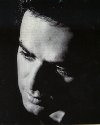 In
1996 Kasparov competed against an IBM computer named Deep Blue, the first
time a world champion had competed against a computer under standard match
conditions. Deep Blue was capable of processing millions of chess positions
per second. Applying this massive computational power, a technique of artificial
intelligence known as brute force, Deep Blue won the first game of the
match to become the first computer to defeat a world champion under regulation
time controls. Kasparov subsequently defeated Deep Blue by a score of 4
games to 2 to win the match. A year later, however, Kasparov accepted a
rematch against an enhanced version of Deep Blue, capable of processing
200 million chess positions per second. Although Kasparov won the first
game, he was defeated in the six-game series 3.5 games to 2.5 games. It
was the first time an international grand master lost a series to a computer.
In
1996 Kasparov competed against an IBM computer named Deep Blue, the first
time a world champion had competed against a computer under standard match
conditions. Deep Blue was capable of processing millions of chess positions
per second. Applying this massive computational power, a technique of artificial
intelligence known as brute force, Deep Blue won the first game of the
match to become the first computer to defeat a world champion under regulation
time controls. Kasparov subsequently defeated Deep Blue by a score of 4
games to 2 to win the match. A year later, however, Kasparov accepted a
rematch against an enhanced version of Deep Blue, capable of processing
200 million chess positions per second. Although Kasparov won the first
game, he was defeated in the six-game series 3.5 games to 2.5 games. It
was the first time an international grand master lost a series to a computer.
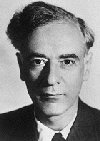 Lev
Davidovich Landau: (1908-1968), Jewish theoretical physicist and Nobel
laureate, noted chiefly for his pioneer work in low-temperature physics
(cryogenics). He was born in Baku the son of an engineer and a physician,
and educated at the universities of Baku and Leningrad. In 1937 Landau
became professor of theoretical physics at the S. I. Vavilov Institute
of Physical Problems in Moscow. His development of the mathematical theories
that explain how superfluid helium behaves at temperatures near absolute
zero earned him the 1962 Nobel Prize in physics. His writings on a wide
variety of subjects relating to physical phenomena include some 100 papers
and many books, among which is the widely known nine-volume Course of Theoretical
Physics, published in 1943 with Y. M. Lifshitz. In January 1962, he was
gravely injured in an automobile accident; he was several times considered
near death and suffered a severe impairment of memory. By the time of his
death he had been able to make only a partial recovery.
Lev
Davidovich Landau: (1908-1968), Jewish theoretical physicist and Nobel
laureate, noted chiefly for his pioneer work in low-temperature physics
(cryogenics). He was born in Baku the son of an engineer and a physician,
and educated at the universities of Baku and Leningrad. In 1937 Landau
became professor of theoretical physics at the S. I. Vavilov Institute
of Physical Problems in Moscow. His development of the mathematical theories
that explain how superfluid helium behaves at temperatures near absolute
zero earned him the 1962 Nobel Prize in physics. His writings on a wide
variety of subjects relating to physical phenomena include some 100 papers
and many books, among which is the widely known nine-volume Course of Theoretical
Physics, published in 1943 with Y. M. Lifshitz. In January 1962, he was
gravely injured in an automobile accident; he was several times considered
near death and suffered a severe impairment of memory. By the time of his
death he had been able to make only a partial recovery.
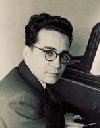 Kara
Karayev: (1918-1982), Born in Baku he studied at music school there
from 1926-1935 (under Sharoyev). He continued his studies at the Baku Conservatory
from 1935-1938 (composition under L.M. Rudolf. He moved on to the Moscow
Conservatory from 1938-1941 (composition under Anatolii Aleksandrov and
orchestration under S. Vasilenko) and from 1943-1946 (composition under
Dmitri Shostakovich). His principal works are three symphonies, suites
and symphonic poems, violin concerto, ballets, opera, oratorio, cantatas,
film music, piano works, two string quartets, sonata for violin and piano.
In his style Karayev is clearly a pupil of Shostakovich. In his music he
tries to make a creative synthesis of a non-western musical idiom with
Western form, harmony and artistic-audience values. Folklore and national
tradition influenced his music.
Kara
Karayev: (1918-1982), Born in Baku he studied at music school there
from 1926-1935 (under Sharoyev). He continued his studies at the Baku Conservatory
from 1935-1938 (composition under L.M. Rudolf. He moved on to the Moscow
Conservatory from 1938-1941 (composition under Anatolii Aleksandrov and
orchestration under S. Vasilenko) and from 1943-1946 (composition under
Dmitri Shostakovich). His principal works are three symphonies, suites
and symphonic poems, violin concerto, ballets, opera, oratorio, cantatas,
film music, piano works, two string quartets, sonata for violin and piano.
In his style Karayev is clearly a pupil of Shostakovich. In his music he
tries to make a creative synthesis of a non-western musical idiom with
Western form, harmony and artistic-audience values. Folklore and national
tradition influenced his music.
Arif Melikov:
(1933- ) Born in Baku he studied from 1946 until 1951 at the Baku Music
College. From 1953 until 1958 he attended Baku Conservatory (studying composition
under Kara Karaev). In 1958 he was appointed to teach at the conservatory,
where he was assistant professor from 1971. From 1979 he is professor in
composition and instrumentation. The Azeri traditional music is the basis
of Melikov's compositions. His principal works have a symphonic form.Melikov
is a symphonist mainly. His works are based on traditional Azerbaijan folklore,
moulding certain international elements of this folklore into classical
form structures.
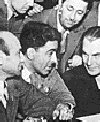 Samad
Vurgun: (1906-1956) Born in the village of Salahli he studied at Baku
Pedagogical University and Moscow State University. Poet, playwriter, academician,
Deputy of the USSR Supreme Soviet, member of Azerbaijan's Parliament, Vice-President
of Azerbaijan's Academy of Sciences, Member of the Soviet Peace Committee,
President of the Writer's Union in Baku, and recipient of both the Stalin
and Lenin Prizes, twice each. He was loved by the regime and invited to
read his poems in the presence of Stalin and to offer a toast in the presence
of Winston Churchill. Vurgun's house in Baku has become a museum, you'll
find it on 4 Teymur Aliyarbeyov St.
Samad
Vurgun: (1906-1956) Born in the village of Salahli he studied at Baku
Pedagogical University and Moscow State University. Poet, playwriter, academician,
Deputy of the USSR Supreme Soviet, member of Azerbaijan's Parliament, Vice-President
of Azerbaijan's Academy of Sciences, Member of the Soviet Peace Committee,
President of the Writer's Union in Baku, and recipient of both the Stalin
and Lenin Prizes, twice each. He was loved by the regime and invited to
read his poems in the presence of Stalin and to offer a toast in the presence
of Winston Churchill. Vurgun's house in Baku has become a museum, you'll
find it on 4 Teymur Aliyarbeyov St.
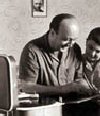 Fikrat
Amirov: (1922-1985). He was born in the northern city of Ganja, the
son of a mugam singer. Among his father's circle was Bul-Bul,
one of the most well known vocalists of the day. Bul-bul invited the Fikrat
to join musicians who were collecting folk songs. From an early age Fikrat
began composing pieces for the piano. After graduating from Ganja Music
College, Fikrat entered Baku State Conservatory and studied under Boris
Zeidman and Uzeyir Hajibeyov. When in 1941 World War II reached the USSR,
Amirov was drafted. Soon he ended up in hospital for shell shock and latter
also operated following an intestinal disease. By 1943 he was back at the
Conservatory, where he graduated. Fikrat was very methodical in his work,
respecting discipline, cleanliness and order. His music is characterized
by a clear melodic line, dramatic intensity and elements from folklore.
Among his most outstanding pieces are works such as "Shur", "Azerbaijan
Capriccio", "The Legend of Nasimi" and "Double Concerto for Violin, Piano
and Orchestra". Besides composing, Amirov was also involved with numerous
responsibilities related to music. He directed the Azerbaijan Opera and
Ballet Theatre, presided over the Azerbaijan Composers' Union in the and
headed the Soviet Composers' Union.
Fikrat
Amirov: (1922-1985). He was born in the northern city of Ganja, the
son of a mugam singer. Among his father's circle was Bul-Bul,
one of the most well known vocalists of the day. Bul-bul invited the Fikrat
to join musicians who were collecting folk songs. From an early age Fikrat
began composing pieces for the piano. After graduating from Ganja Music
College, Fikrat entered Baku State Conservatory and studied under Boris
Zeidman and Uzeyir Hajibeyov. When in 1941 World War II reached the USSR,
Amirov was drafted. Soon he ended up in hospital for shell shock and latter
also operated following an intestinal disease. By 1943 he was back at the
Conservatory, where he graduated. Fikrat was very methodical in his work,
respecting discipline, cleanliness and order. His music is characterized
by a clear melodic line, dramatic intensity and elements from folklore.
Among his most outstanding pieces are works such as "Shur", "Azerbaijan
Capriccio", "The Legend of Nasimi" and "Double Concerto for Violin, Piano
and Orchestra". Besides composing, Amirov was also involved with numerous
responsibilities related to music. He directed the Azerbaijan Opera and
Ballet Theatre, presided over the Azerbaijan Composers' Union in the and
headed the Soviet Composers' Union.
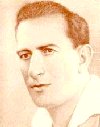 Bul-Bul:
(1897-1971). Born in Shusha, in the Nagorno
Karabakh region, Bul-Bul (meaning nightingale) is Emblematic of Azerbaijan,
as an artist who made the best synthesis of east and west. Having started
his career as a "khanade" folk singer, in 1921 he entered the Azerbaijan
State conservatoire to get a classical musical education, later completing
his studies in Milan. With these experiences, he went on to transfer his
oriental singing into the European singing school, in the process creating
a new vocal tradition in Azerbaijan, probably one of the first experiments
in what is now called "World Music". He was a singer, an actor, a teacher,
a musical researcher and innovator, attracting the highest honours conferred
by the government of his time. In Baku you can visit the Bul-bul
Museum on 15 Bul-bul Av.
Bul-Bul:
(1897-1971). Born in Shusha, in the Nagorno
Karabakh region, Bul-Bul (meaning nightingale) is Emblematic of Azerbaijan,
as an artist who made the best synthesis of east and west. Having started
his career as a "khanade" folk singer, in 1921 he entered the Azerbaijan
State conservatoire to get a classical musical education, later completing
his studies in Milan. With these experiences, he went on to transfer his
oriental singing into the European singing school, in the process creating
a new vocal tradition in Azerbaijan, probably one of the first experiments
in what is now called "World Music". He was a singer, an actor, a teacher,
a musical researcher and innovator, attracting the highest honours conferred
by the government of his time. In Baku you can visit the Bul-bul
Museum on 15 Bul-bul Av.
| A to Z of Azerbaijan
/ A dan Z ye Azerbaycan |
www.azerb.com
|
 Garry
Kimovich Kasparov: (1963- ), chess player and world chess champion
of Jewish-Armenian descent, who competes for Russia. At the age of 22 he
became the youngest world chess champion in history. Born Garri Weinstein
in Baku, Azerbaijan, he learned chess from his father, who died when Garri
was seven years old. He subsequently adopted his mother's maiden name (Russian
adaptation of the Armenian "Kasparian"). At the age of 12 Kasparov won
the Azerbaijan championship and the USSR junior championship, and at the
age of 16 he won the world junior championship. In 1980, at the age of
17, "Garik," as he was known in the USSR earned the International Grandmaster
title. Two years later Kasparov became a candidate for the world championship,
and in 1984 he earned the right to challenge the world champion, Russian
Anatoly Karpov. Their first match was stopped, after it had lasted six
months without a deciding result. In 1985 Kasparov won a match against
Karpov and became the world champion. He defended his title by beating
Karpov in 1986, then tied a match with him in 1987 (a champion keeps the
title if the match ends in a tie). Kasparov beat Karpov again in 1990 and
retained his championship.
Garry
Kimovich Kasparov: (1963- ), chess player and world chess champion
of Jewish-Armenian descent, who competes for Russia. At the age of 22 he
became the youngest world chess champion in history. Born Garri Weinstein
in Baku, Azerbaijan, he learned chess from his father, who died when Garri
was seven years old. He subsequently adopted his mother's maiden name (Russian
adaptation of the Armenian "Kasparian"). At the age of 12 Kasparov won
the Azerbaijan championship and the USSR junior championship, and at the
age of 16 he won the world junior championship. In 1980, at the age of
17, "Garik," as he was known in the USSR earned the International Grandmaster
title. Two years later Kasparov became a candidate for the world championship,
and in 1984 he earned the right to challenge the world champion, Russian
Anatoly Karpov. Their first match was stopped, after it had lasted six
months without a deciding result. In 1985 Kasparov won a match against
Karpov and became the world champion. He defended his title by beating
Karpov in 1986, then tied a match with him in 1987 (a champion keeps the
title if the match ends in a tie). Kasparov beat Karpov again in 1990 and
retained his championship.
 In
1996 Kasparov competed against an IBM computer named Deep Blue, the first
time a world champion had competed against a computer under standard match
conditions. Deep Blue was capable of processing millions of chess positions
per second. Applying this massive computational power, a technique of artificial
intelligence known as brute force, Deep Blue won the first game of the
match to become the first computer to defeat a world champion under regulation
time controls. Kasparov subsequently defeated Deep Blue by a score of 4
games to 2 to win the match. A year later, however, Kasparov accepted a
rematch against an enhanced version of Deep Blue, capable of processing
200 million chess positions per second. Although Kasparov won the first
game, he was defeated in the six-game series 3.5 games to 2.5 games. It
was the first time an international grand master lost a series to a computer.
In
1996 Kasparov competed against an IBM computer named Deep Blue, the first
time a world champion had competed against a computer under standard match
conditions. Deep Blue was capable of processing millions of chess positions
per second. Applying this massive computational power, a technique of artificial
intelligence known as brute force, Deep Blue won the first game of the
match to become the first computer to defeat a world champion under regulation
time controls. Kasparov subsequently defeated Deep Blue by a score of 4
games to 2 to win the match. A year later, however, Kasparov accepted a
rematch against an enhanced version of Deep Blue, capable of processing
200 million chess positions per second. Although Kasparov won the first
game, he was defeated in the six-game series 3.5 games to 2.5 games. It
was the first time an international grand master lost a series to a computer.
 Mstislav
Rostropovich: (1927- ), The most esteemed cellist of his generation.
Born in Baku as the Soviet Union was becoming consolidated. At a tender
age he learned cello and piano from his parents. He studied (and later
taught) at the Moscow Conservatory. In 1950 he wins the International Cello
Competition in Prague, starting a career as a professional cellist, that
after 1961 develops into a double career as a cellist and conductor. He
also performs as pianist in recitals by his wife, the Soviet-born soprano
Galina Vishnevskaya. Despite winning the Lenin Prize, a Soviet state award,
in 1963, he sheltered the Soviet dissident Aleksandr Solzhenitsyn; in 1974
Rostropovich and his wife left the USSR, and in 1978 their citizenship
was revoked. Having emigrated to the United States, he became conductor
of the National Symphony Orchestra in Washington, D.C., in 1977. He was
invited to perform with his orchestra in the USSR in 1990, and his and
his wife's Soviet citizenship were restored.
Mstislav
Rostropovich: (1927- ), The most esteemed cellist of his generation.
Born in Baku as the Soviet Union was becoming consolidated. At a tender
age he learned cello and piano from his parents. He studied (and later
taught) at the Moscow Conservatory. In 1950 he wins the International Cello
Competition in Prague, starting a career as a professional cellist, that
after 1961 develops into a double career as a cellist and conductor. He
also performs as pianist in recitals by his wife, the Soviet-born soprano
Galina Vishnevskaya. Despite winning the Lenin Prize, a Soviet state award,
in 1963, he sheltered the Soviet dissident Aleksandr Solzhenitsyn; in 1974
Rostropovich and his wife left the USSR, and in 1978 their citizenship
was revoked. Having emigrated to the United States, he became conductor
of the National Symphony Orchestra in Washington, D.C., in 1977. He was
invited to perform with his orchestra in the USSR in 1990, and his and
his wife's Soviet citizenship were restored.


 Samad
Vurgun: (1906-1956) Born in the village of Salahli he studied at Baku
Pedagogical University and Moscow State University. Poet, playwriter, academician,
Deputy of the USSR Supreme Soviet, member of Azerbaijan's Parliament, Vice-President
of Azerbaijan's Academy of Sciences, Member of the Soviet Peace Committee,
President of the Writer's Union in Baku, and recipient of both the Stalin
and Lenin Prizes, twice each. He was loved by the regime and invited to
read his poems in the presence of Stalin and to offer a toast in the presence
of Winston Churchill. Vurgun's house in Baku has become a museum, you'll
find it on 4 Teymur Aliyarbeyov St.
Samad
Vurgun: (1906-1956) Born in the village of Salahli he studied at Baku
Pedagogical University and Moscow State University. Poet, playwriter, academician,
Deputy of the USSR Supreme Soviet, member of Azerbaijan's Parliament, Vice-President
of Azerbaijan's Academy of Sciences, Member of the Soviet Peace Committee,
President of the Writer's Union in Baku, and recipient of both the Stalin
and Lenin Prizes, twice each. He was loved by the regime and invited to
read his poems in the presence of Stalin and to offer a toast in the presence
of Winston Churchill. Vurgun's house in Baku has become a museum, you'll
find it on 4 Teymur Aliyarbeyov St.

